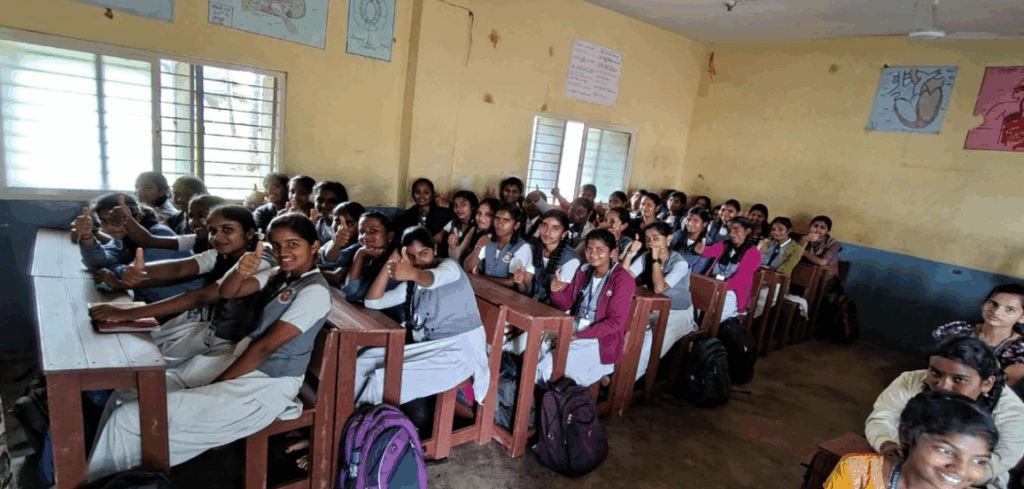Every day, over 33 million children in India study sitting on bare floors, while plastic waste overwhelms landfills due to ineffective recycling.
Bengaluru-based startup unWOOD, co-founded by mechanical engineer Vishal Mehta and material scientist Dr Babu Padmanabhan, is transforming unrecyclable plastic into durable, wood-like furniture.
Since its official launch in April 2025, unWOOD has recycled over 10 metric tonnes of plastic and saved 31 trees, providing hundreds of rural Karnataka students with comfortable benches and significantly reducing carbon emissions.
Turning Plastic Waste into Durable, Eco-Friendly Furniture
unWOOD’s breakthrough lies in its proprietary Macro Molecular Fiber Matrix (MMFM) technology, developed by Dr Babu Padmanabhan, a visionary kinemetician and scientist with decades of expertise in material transformation.
The process combines unrecyclable plastic waste, such as snack wrappers, PPE kits, and multilayered packaging, with natural fibres using a patented compounding method that requires no water or high heat.

Their SAFEReCYCLER machine grinds plastic waste into tiny pieces, which are then transformed into strong, moisture- and heat-resistant boards that outperform natural wood in durability and maintenance. Each kilogram of unWOOD furniture uses 500 grams of plastic waste and reduces 1.5 kilograms of carbon emissions.
The startup’s products include outdoor benches, tables, railings, and fencing designed to withstand harsh weather conditions, offering a sustainable solution for schools, parks, and public spaces.
Addressing Educational and Environmental Challenges Simultaneously
India faces a dual crisis: millions of children lack basic classroom furniture, while plastic waste continues to accumulate in landfills and waterways. unWOOD’s Benches for Change initiative is reshaping classrooms in rural Karnataka by providing sturdy, comfortable benches made entirely from recycled plastic.
In just four months, the programme has benefited over 440 students and recycled more than 10 tonnes of plastic waste, equivalent to saving 31 mature trees and repurposing thousands of plastic bottles, chip packets, and broken toys.
The initiative not only improves learning environments by giving children dignity and comfort but also raises awareness about sustainability and circular economy principles. unWOOD partners with local communities and NGOs to scale its impact and promote environmental stewardship, demonstrating how innovation can bridge social and ecological gaps.
Founders’ Vision: Innovation Meets Sustainability
Dr Babu Padmanabhan’s decades of research in material science led to the development of unWOOD’s patented technology, which mimics the strength, look, and feel of hardwood while using plastic waste that conventional recycling ignores. His vision was to create a sustainable alternative to wood that could reduce deforestation and plastic pollution simultaneously.

Vishal Mehta, a mechanical engineer and co-founder, brings entrepreneurial drive and a passion for environmental impact. He emphasises, “If we can make the world sit on trash, comfortably, sustainably, and proudly, then we’ve done our job.” Together, they have built a company that not only creates eco-friendly products but also inspires a circular economy mindset.
unWOOD in the Context of Global Sustainable Furniture Trends
The global market for wood-plastic composites (WPCs) is expected to grow significantly, driven by demand for sustainable building materials and stricter environmental regulations. unWOOD’s technology aligns with this trend, offering a scalable, eco-friendly alternative to traditional wood and plastic furniture.
Industry experts predict that by 2025, sustainable furniture made from recycled and natural materials will dominate consumer preferences, reflecting a shift towards ethical business practices and environmental responsibility.
Furniture trends for 2025 highlight multifunctionality, minimalism, and the use of natural or recycled materials, all principles embodied by unWOOD. The company’s approach also resonates with the growing consumer desire for products with meaningful stories and positive social impact.
The Logical Indian’s Perspective
At The Logical Indian, we celebrate unWOOD’s pioneering work that merges environmental responsibility with social impact. Their model exemplifies how creative, community-driven solutions can transform waste into opportunity, fostering dignity for children and care for the planet.
This initiative reminds us that sustainability and education are deeply interconnected, and that embracing circular economy principles can lead to meaningful, positive change.













